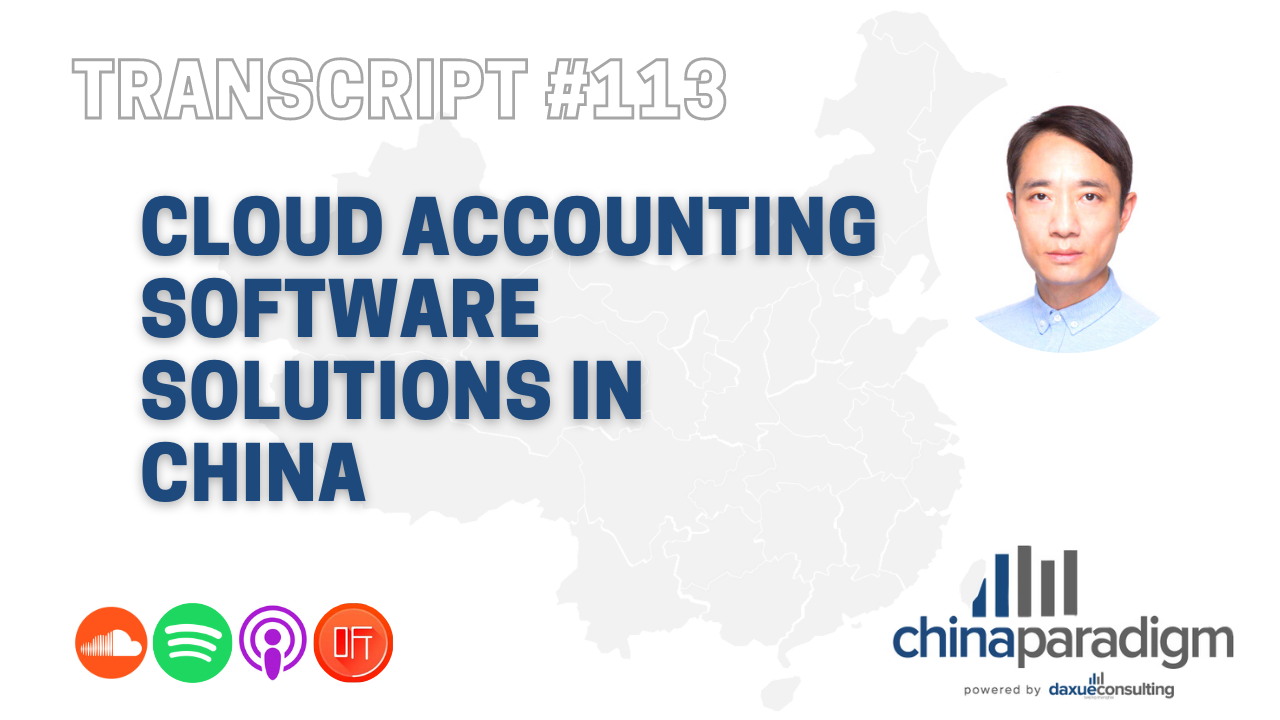Michael Chiao is co-founder of MEGI. They offer cloud accounting software solutions in China. Making it easy for businesses to manage their finances digitally. Their cloud accounting software service is provided on a SaaS basis. Most of their clients are international companies operating in China. However, they see a strong trend of Chinese companies gradually embracing digital accounting. What sets their software apart from competitors in China is the beautifully designed accounting software and streamlined nature of their platform.
Listen to the full China Paradigm episode 113 on Youtube, Apple Podcast, Spotify, or Soundcloud.
Here is a transcript of our interview with an entrepreneur who is developing cloud accounting software solutions in China, Michael Chiao
Today we are chatting with Michael Chiao, the co-founder of Megi Cloud Accounting Software, he also works as director of People and Culture at Axel standard. Megi is cloud-based accounting software for the management and controlling of small and startup businesses in China. Megi also offers bookkeeping, TAX filing, annual compliance completion, as well as financial and management advisory service.
Can you give us a brief company history of MEGI?
Michael Chiao: We started providing cloud accounting software solutions in China about 6 years ago (2020). We have been expanding steadily but very slowly.
How did the coronavirus outbreak affect the company’s growth?
Throughout coronavirus, we didn’t see a decrease in our clientele, and the companies we service did ok throughout the period because they are well managed. We actually saw a slight increase which is in line with our normal growth rate.
What is the current size of MEGI ‘s client base?
Around 1,000. 90% foreign companies
Are these small numbers or niche numbers – what is MEGI’s focus demographic?
They are small relative to global players but yes we are niche, our foreign counterparts are focused on the global market whereas we focus only on the Chinese market. Big companies like Xero find it difficult to enter China.
What are the cultural differences in terms of finance management between foreign companies and local companies in China?
Foreign companies are more serious about managing their finances. Perhaps because foreign companies are more used to slower growth and because of this they really focus down on efficiency, this means they are more willing to adopt cloud accounting software solutions in China and in their home countries. But the biggest reason is culture, foreign companies employ a more scientific approach to managing their businesses. Tax evasion is extremely common in China for small businesses and they won’t want their data on the cloud.
Why are companies slow to adopt cloud accounting software solutions in China?
Mostly Chinese businesses are heavily invested in sales and business development rather than investing in cost /time-saving efficiencies and R&D. And it is relatively easy to evade tax here.
Are Chinese small and medium-sized companies changing the way they manage their business finances?
Although most of our clients are foreign companies. We have definitely seen a trend of domestically managed and owned businesses adopting our cloud accounting software solutions in China. There are some patterns here, a lot of these young managers now have experience in the Western business culture and environment and they bring back the same culture to China which I think is a good thing. Also, because of government tax reform, it is getting harder and harder to evade tax.
What is the current company annual revenue?
Currently it is under 5 million.
What was the initial subscriber goal for MEGI?
Initially, we aimed for a much higher volume of clients. We knew at the offset that it would take a long time for native companies to adopt cloud accounting software solutions in China but we also knew that there was a large base of international companies in china that we could rely on first while we waited for the Chinese companies to begin adopting the services we provide.
What specific key features do clients value for MEGI?
It depends on the sectors the companies are in. But banking reconciliation for companies in China is maybe one of the most popular features because it allows businesses to track credit and debit and the money coming in and out of their business. Also, we give them digital fapiaos which are very necessary in China.
How difficult is the process of banking reconciliation for companies in China without MEGI?
Banks in China don’t have very good digital infrastructure. We have beautifully designed accounting software platforms and this makes it easier for businesses to deal with Chinese banks. They can upload the excel sheets that banks send them directly onto our system.
How hard is it to integrate MEGI software with China’s baking system software? How open are Chinese banks to companies like yours?
Banks will make these features available for big businesses but for most small businesses this level of automation is still unaffordable. However, our beautifully designed accounting software platform makes this process very streamlined and easy and you can download and upload your bank statements within 2 minutes. This helps them to be better at tracking their cashflow, making sure they collect money and pay what they owe in time.
How is MEGI incorporating mobile financing services at present?
Well, our core functionality is about providing banking reconciliation for companies in China. We are not necessarily focusing on mobile options but we are working with partners who are creating software that allows them to scan fapiaos with their phones and directly upload these expense claims immediately to our online platform.
Why did MEGI decide to focus on digital ledger services and financial statements?
I used to work at the biggest ERP company in China and these huge companies would offer hundreds of different services but increasingly the trend has been in small, specialized software providers that really excel in one particular aspect of the software, taking segments of the market from these big companies. Eventually, these separate focus areas can form a web that can be integrated to meet all the needs of the business.
Some software like App Annie collect data on all of their clients and can then let their customers know in which areas they are performing better than the average of their competitors and in what areas they are performing worse than average. Has MEGI achieved the critical mass to make this happen yet?
We are thinking about bringing this feature online soon. One thing we offer is that after gathering a client’s data for a few years, this can be used by the companies to apply for loans and show the banks that their cashflow situation is very good. But we have not achieved critical mass just yet, hopefully, in the next few years, we will see that.
What type of loans can small and medium companies expect to get from other companies or banks in China?
Chinese banks are very reluctant to offer credit to small businesses because it takes so much time and energy to evaluate each small business’ credit score but this kind of process can be speeded up with cloud technology solutions. Also, banks in China are state owned and conservative, they don’t want to make any mistakes or take risks. There is a long way to go but we are pioneering this trend in managing businesses very well.
What is the process of deciding and then implementing a new feature for MEGI?
Most of the features we add come from clients’ feedback. We update our features every 2 months on average.
Is listening to your client a key requirement in software feature development?
Yes and no. If a client wants some feature that conflicts with our highly functional and beautifully designed accounting software, we will recommend another company whose features can be integrated with ours. We do not want to sacrifice our high usability for the sake of having every feature possible.
What is Axel Standard and what do they do?
The lack of top-quality accountants has hindered our growth. We need accountants who can think outside the box and really understand the companies they work for and provide creative solutions to problems. There is a lack of these kinds of accountants in China and at Axel Standard this is something we tried to solve.
How has computer science evolved since 1998?
I studied computer science in Chengdu in 1998. I learned Basic on Apple 2 almost 30 years ago. But I am not a programmer.
How has China benefited over the years by opening up to the world?
I think China has benefited a lot from opening up, we absorbed a lot of technology which allowed us to develop a large base of industries and eventually drive up our GDP. China has also benefited from bringing in excellent foreign businesses and professionals who have also helped to drive growth in China. Also, foreign businesses are also quite transparent and pay their fair share of taxes and the government has recognized this and is increasingly making the playing field more level between foreign and domestic businesses.
Listen to the full China Paradigm episode 113 on Youtube, Apple Podcast, Spotify, or Soundcloud.





